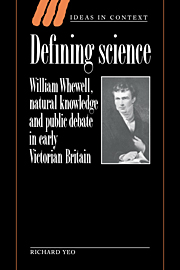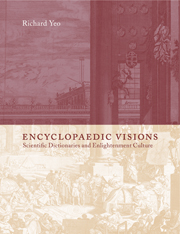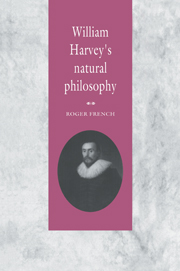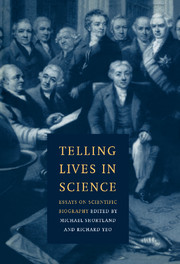Defining Science
This 1993 book deals with debates about science - its history, philosophy and moral value - in the first half of the nineteenth century, a period in which the 'modern' features of science developed. Defining Science also examines the different forms or genres in which science was discussed in the public sphere - most crucially in the Victorian review journals, but also in biographical, historical and educational works. William Whewell wrote major works on the history and philosophy of science before these became technical subjects. Consequently he had to define his own role as a metascientific critic (in a manner akin to cultural critics like Coleridge and Carlyle) as well as seeking to define science for both expert and lay audiences.
- Major re-interpretation of the first great historian and philosopher of science
- Important contribution to debates about Victorian scientific culture
- Study of the emergence of a distinctive scientific vocabulary - Whewell first to coin the term 'scientist'
Reviews & endorsements
"...not until the publication of this important book by Richard Yeo has something near to a complete picture of Whewell been produced...Yeo provides lucid analysis of Whewell's major works and locates them in the journalistic debates of the era. This volume provides the best current introduction to Whewell's thought....readers and students stand in Yeo's debt and will benefit from his research for many years." Victorian Studies
"Yeo has written a significant book that synthesizes much recent work on Whewell and his context while also advancing its own original thesis. It will serve as a fine introduction to an extraordinary individual. It will also raise new questions to be considered by all who are interested in the intellectual life of nineteenth century Britain." American Historical Review
"Yeo ...has illluminated many aspects of debates about the nature and status of nineteenth-century science." Canadian Journal of History
Defining Science self-consciously takes Whewell's initial choice of vocation as its point of departure and brilliantly analyzes how it was achieved. It surveys the full range of Whewell's metascientific writings, contextualizing each major text in terms of its genre, its intended audience, and its wider polemical framework. It is hence at once a seminal vocational biography of the most prominent Victorian metascientist and a penetrating study of the complex debate about the nature of science in nineteenth-century Britain. It is a book no student of Victorian intellectual history can afford to ignore." Menachem Fisch, Isis
"...Yeo succeeds admirably in his self-assigned task." Albion
"VPR readers will find much to interest them in what Yeo has to say about Whewell, periodical literature, and the discourse of science." Christopher Kent, Victorian Periodical Review
Product details
April 2011Adobe eBook Reader
9780511881923
0 pages
0kg
This ISBN is for an eBook version which is distributed on our behalf by a third party.
Table of Contents
- Preface
- 1. Introduction
- 2. Science and the public sphere
- 3. Metascience as a vocation
- 4. Reviewing science
- 5. Moral scientists
- 6. Using history
- 7. Moral science
- 8. Science, education and society
- 9. The unity of science.







